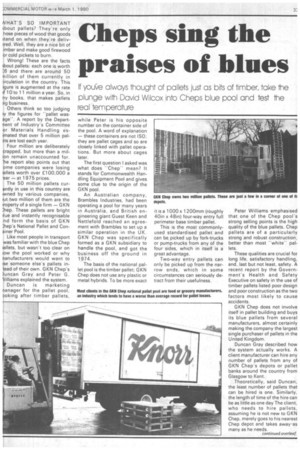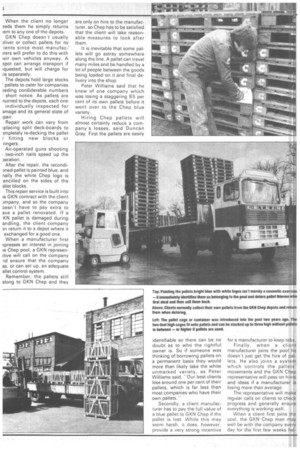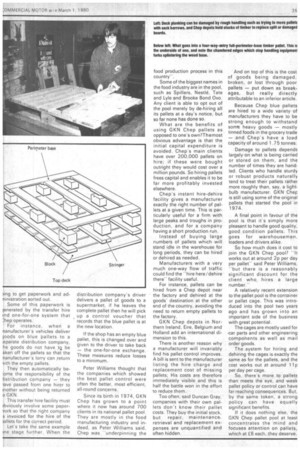Cheps sing the praises of blues
Page 35

Page 36

Page 37

If you've noticed an error in this article please click here to report it so we can fix it.
If yodie always thought of pallets just as bits of timber, take e plunge wi-n Davic WIcox into Chops blue pool and test to real temperature
NHAT'S SO IMPORTANT thou/ pallets? They're only hose pieces of wood that goods ;tend on when they're delivred. Well, they are a nice bit of imber and make good firewood or cold pickets to burn.
Wrong! These are the facts lbout pallets: each one is worth =6 and there are around 50 nillion of them currently in :irculation in the country. This igure is augmented at the rate
111 1 to 11 million a year. So, in ny books, that makes pallets ig business.
Others think so too judging )y the figures for "pallet wasage'. A report by the Departnent of Industry's Committee or Materials Handling esimated that over 5 million pal..ts are lost each year.
Four million are deliberately crapped, but more than a milion remain unaccounted for. he report also points out that :)me companies were losing rallets worth over £100,000 a tar — at 1975 prices.
The 50 million pallets curently in use in this country are iwned by various companies, iut two million of them are the iroperty of a single firm — GKN :hep. These pallets are bright due and instantly recognisable nd form the basis of GKN :hep's National Pallet and Conainer Pool.
Like most people in transport was familiar with the blue Chep iallets, but wasn't too clear on low the pool worked or why nanufacturers would want to Ise someone else's pallets intead of their own. GKN Chep's )uncan Gray and Peter G. Villiams explained the system.
Duncan is marketing nanager for the pallet pool, poking after timber pallets, while Peter is his opposite number on the container side of the pool. A word of explanation — these containers are not ISO; they are pallet cages and so are closely linked with pallet operations. But more about cages later.
The first question I asked was what does "Chepmean? It stands for Commonwealth Handling Equipment Pool and gives some clue to the origin of the GKN pool.
An Australian company, Brambles Industries, had been operating a pool for many years in Australia, and British engineering giant Guest Keen and Nettlefold reached an agreement with Brambles to set up a similar operation in the UK. GKN Chep was specifically formed as a GKN subsidiary to handle the pool, and got the business off the ground in 1974.
The basis of the national pallet pool is the timber pallet; GKN Chep does not use any plastic or metal hybrids. To be more exact it is a 1000 x 1200mm (roughly 40in x 48in) four-way entry full perimeter base timber pallet.
This is the most commonlyused standardised pallet and can be picked up by fork-trucks or pump-trucks from any of the four sides, which in itself is a great advantage.
Two-way entry pallets can only be picked up from the narrow ends, which in some circumstances can seriously detract from their usefulness.
Peter Williams emphasised that one of the Chep pool's strong selling points is the high quality of the blue pallets. Chep pallets are of a particularly strong and robust construction, better than most "whitepallets.
These qualities are crucial for long life, satisfactory handling, and, last but not least, safety. A recent report by the Government's Health and Safety Executive on safety in the use of timber pallets listed poor design and poor construction as the two factors most likely to cause accidents.
GKN Chep does not involve itself in pallet building and buys its blue pallets from several manufacturers, almost certainly making the company the largest single purchaser of pallets in the United Kingdom.
Duncan Gray described how the system actually works. A client manufacturer can hire any number of pallets from any of GKN Chep's depots or pallet banks around the country from Glasgow to Kent.
Theoretically, said Duncan, the least number of pallets that can be hired is one. Similarly, the length of time of the hire can be as little as one day The client, who needs to hire pallets, assuming he is not new to GKN Chep, merely goes to his nearest Chep depot and takes away-as many as he needs. When the client no longer aeds them he simply returns len, to any one of the depots, GKN Chep doesn't usually aliver or collect pallets for its lents since most manufac-' irers will prefer to do this with leir own vehicles anyway. A apot can arrange transport if :quested, but will charge for is separately.
The depots hold large stocks pallets to cater for companies Deding conS'iderable numbers short notice. As pallets are :turned to the depots, each one individually inspected for 3mage and its general state of !pair.
Repair work can vary from !placing split deck-boards to )mpletely re-decking the pallet r fitting new blocks or ringers.
Air-operated guns shooting two-inch nails speed up the aeration.
After the repair, the recondiailed pallet is painted blue, and nally the white Chep logo is encilled on the sides of the allet blocks.
This repair service is built into le GKN contract with the client )mpany, and so the company Desn't have to pay extra to eve a pallet renovated. If a KN pallet is damaged during andling, the client company )n return it to a depot where it exchanged for a good one. When a manufacturer first Remember, the pallets still along to GKN Chep and they are only on hire to the manufacturer, so Chop has to be satisfied that the client will take reasonable measures to look after them. It is inevitable that some pallets will go astray somewhere along the line. A pallet can travel many miles and be handled by a lot of people between the goods being loaded on it and final delivery into the shop. Peter Williams said that he knew of one company which was losing a staggering 65 per cent of its own pallets before it went over to the Chep blue variety. Hiring Chep pallets will almost certainly reduce a company's losses, said Duncan Gray. First the pallets are easily identifiable so there can be no doubt as to who the rightful owner is. So if someone was thinking of borrowing pallets on a permanent basis they would • more than likely take the white unmarked variety, as Peter Williams said, "Our best clients lose around one per cent of their pallets, which is far less than most companies who have their own pallets." Secondly, a client manufacturer has to pay the full value of a blue pallet to GKN Chep if the pallet is lost. While this may seem harsh, it does, however, • provide a very strong incentive for a manufacturer to keep tabs. Finally, when a client manufacturer joins the pool he doesn't just get the hire of pallets. He also joins a system which controls the pallets' movements and the GKN Chep representative will pass on hints and ideas if a manufacturer is losing more than average. The representative will make regular calls on clients to check progress and generally ensure everything is working well When a client first joins the pool, the GKN Chep man may well be with the company every day for the first few weeks hel )ing to get paperwork and adninistration sorted out. Some of this paperwork is jenerated by the transfer hire il.nd one-for-one system that 2hep operates. For instance, when a nanufacturer's vehicles deliver joods on blue Pallets to a ;eparate distribution company, he goods do not have tg be ken off the pallets so that the nanufacturer's lorry can return vith the empty pallets. They then automatically be:ome the responsibility of the fistribution company — they ave .passed from one hirer to ilnother without being returned GKN. This transfer hire facility must thviously involve some papervork so that the right company $ invoiced for the hire of the )allets for the correct period. Let's take the same example ne stage further.. When the distribution company's driver delivers a pallet of goods to a supermarket, if he leaves the complete pallet then he will pick up a control voucher that records that the blue pallet is at the new location. If the shop has an empty blue pallet, this is changed over and given to the driver to take back — the one-for-one exchange. These measures reduce losses to a minimum. Peter Williams thought that the companies which showed the best pallet control were often the better, most efficient, all-round concerns. Since its birth in 1974, GKN Chep has grown to a point where it now has around 700 clients in its national pallet pool. They are mostly in the food manufacturing industry and indeed, as Peter Williams said, Chep was "underpinning the food production process in this country". Some of the biggest names in the food industry are in the pool, such as Spillers, Nestle, Tate and Lyle and Brooke Bond Oxo. Any client is able to opt out of the pool merely by de-hiring all its pallets at a day's notice, but so far none has done so. What are the benefits of using GKN Chep pallets as opposed to one's own?Themost obvious advantage is that the initial capital expenditure is avoided. Chep's main clients have over 200,000 pallets on hire; if these were bought outright they would cost over a million pounds. So hiring pallets frees capital and enables it to be far more profitably invested elsewhere. Chep's instant hire-dehire facility gives a manufacturer exactly the right number of pallets at a given time. This is particularly useful for a firm with large peaks and troughs in production, and for a company having a short production run. Instead of buying large numbers of pallets which will stand idle in the warehouse for long periods, they can be hired or dehired as needed. Manufacturers with a very much one-way flow of traffic could find the "hire here /dehire there" facility useful. For instance, pallets can be hired from a Chep depot near the factory and dehired at the goods' destination at the other end of the country, avoiding the need to return empty pallets to the factory. GKN Chep depots in Northern Ireland, Eire, Belgium and Holland add an international dimension to this. There is another reason why a manufacturer will invariably find his pallet control improves. A bill is sent to the manufacturer listing the hire charge and replacement cost of missing pallets; His costs are therefore immediately visible and this is half the battle won in the effort to reduce them. Too often, said Duncan Gray, companies with their own pallets don't know their pallet costs. They buy the initial stock, but repair, maintenance. retrieval and replacement expenses are unquantified and often hidden. And on top of this is the cost of goods being damaged, broken, or lost through poor pallets — put down as breakages, but really directly attributable to an inferior article. Because Chep blue pallets are hired to a wide variety of manufacturers they have to be strong enough to withstand some heavy goods — mostly tinned foods in the grocery trade — and Chep's have a load capacity of around 1.75 tonnes. Damage to pallets depends largely on what is being carried or stored on them, and the number of times they are handled. Clients who handle sturdy or robust products naturally tend to treat their pallets rather more roughly than, say, a light. bulb manufacturer. GKN Chep is still using some of the original pallets that started the pool in 1974. A final point in favour of the pool is that it's simply more pleasant to handle good quality, good condition pallets. This goes for warehousemen, loaders and drivers alike. So how much does it cost to join the GKN Chep pool? "It works out at around 2p per day per pallet" said Peter Williams, "but there is a reasonably significant discount for the client who, hires a large number." A relatively recent extension to the pallet pool is the container or pallet cage. This was introduced into the pool two years ago and has grown into an important side of the business with great potential. The cages are mostly used for :car parts and other engineering components as well as mail order goods. The .system for hiring and dehiring the cages is exactly the same as for the pallets, and the cost works out at around 11p per day per cage. So, there's more to pallets than meets the eye, and weak pallet policy or control can have far reaching consequences. But, by the same token, a strong policy can have equally significant benefits. If it does nothing else, the GKN Chep pallet pool at least concentrates the mind and focuses attention on pallets, which at £6 each. they deserve.Tags
















































































































